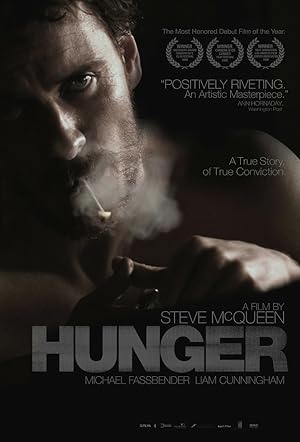Hunger
| 2008Directed by: Steve McQueen
Main Plot
Hunger follows the harrowing true story of the 1981 Irish hunger strike led by political prisoners in the Maze Prison. The film centers on the experiences of Bobby Sands, a member of the Provisional Irish Republican Army, who is determined to protest against the British government's refusal to recognize the prisoners as political inmates. As conditions in the prison worsen, Sands and his fellow inmates resort to a hunger strike to demand basic rights, including the right to wear their own clothes and receive political status. The film portrays the brutal realities of prison life, the physical and psychological toll of the hunger strike, and the escalating tensions between the prisoners and the authorities. Through stark and powerful imagery, Hunger explores themes of resistance, sacrifice, and the human spirit's struggle for dignity in the face of oppression.
Characters
- Stuart Graham portrays Raymond Lohan, a prison officer who grapples with the moral complexities and brutal realities of his job during the 1981 Irish hunger strike.
- Laine Megaw plays the role of Raymond Lohan's wife, providing a personal glimpse into the life of a prison officer during the 1981 Irish hunger strike.
- Brian Milligan plays Davey Gillen, a young IRA prisoner. His character's experiences highlight the brutal conditions and the prisoners' determination during the 1981 hunger strike.
Ending Explained
In the ending of Hunger, the film culminates in a powerful and harrowing depiction of Bobby Sands' hunger strike, which serves as a pivotal moment in the narrative. After enduring severe physical deterioration, Sands reaches a point of profound suffering, reflecting the extreme lengths to which he and his fellow prisoners are willing to go to protest their treatment and demand political recognition. The film's final scenes focus on Sands' frail condition as he becomes increasingly weak, yet his resolve remains unbroken. As Sands approaches death, the film emphasizes the psychological and spiritual dimensions of his struggle. His refusal to eat is not just a personal sacrifice but a political statement aimed at raising awareness of the plight of Irish republican prisoners. The climax is marked by Sands' death, which symbolizes both a tragic loss and a martyrdom that ignites further political discourse and mobilization. The ending resolves the main conflict by illustrating the consequences of the hunger strike, highlighting the brutal realities of the conflict in Northern Ireland. It connects to the overall narrative by underscoring themes of sacrifice, identity, and the fight for justice, leaving a lasting impact on the audience regarding the human cost of political struggles.
